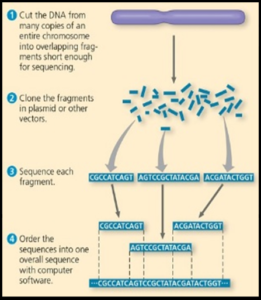REVOLUTIONIZING GENOMICS
About Genome Sequencing
Genome sequencing is the process of determining the complete sequence of nucleotides in an organism’s DNA. It reveals the genetic blueprint of an organism, offering insights into its biology, evolution, and potential for disease.
Source: Quizlet
Population-Scale Genome Sequencing:
- Genomics has undergone a revolutionary shift with advanced technologies, enabling cost-effective whole-genome sequencing.
- The UK recently achieved a milestone, completing half a million whole-genome sequences, showcasing the transformative potential of such datasets.
DeCODE Initiative and Global Efforts:
- The deCODE genomics initiative in Iceland initiated large-scale population genetic studies, significantly contributing to understanding diseases and genetic data utilization.
- Worldwide, numerous population-scale genome initiatives have emerged, such as the UK’s “100K Genome” project and global endeavors by pharmaceutical companies, aiming to sequence hundreds of thousands of genomes for healthcare advancements.
Challenges and Expanding Horizons:
- Population-scale genomics faces challenges, including
- ethical considerations,
- equitable representation, and
- access to genomic data.
- Asia, including India, actively participates in population-level sequencing projects like GenomeAsia and GenomeIndia, aiming to sequence diverse populations and uncover genetic insights.
- Population-scale genomics extends beyond individual health, influencing our understanding of human evolution, migration patterns, and adaptation, paving the way for personalized healthcare and advancing biological knowledge.

 Source: Quizlet
Source: Quizlet

